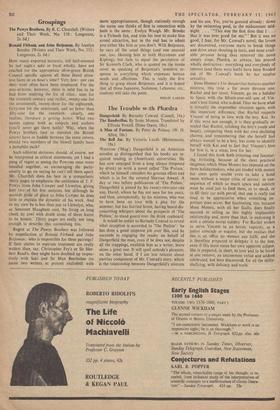Groupings
'The Powys Brothers. By R. C. Churchill (Writers and Their Work, No. 150: Longmans, 2s. 6d.)
How many exported lecturers, still half-stunned by last night's saki or local whisky, have not reached for the appropriate olive-green British Council specific against all those bland atten- tive faces in an hour's time? Very few: nor can their trust often have been misplaced. For the stay-at-home. however, there is mild fun to be had from studying the list of titles: nine for the sixteenth century and earlier, twenty-one for the seventeenth, twenty-three for the eighteenth, forty-one for the nineteenth, and no fewer than fifty-nine for the twentieth: clearly, one realises, literature is getting better. What two names appear both as subjects and authors (you'll never get them both)? Why, when the Powys brothers (not to mention the Brontë sisters) have to huddle between the same covers, should two members of the Sitwell family have a pamphlet each?
Such editorial decisions should, of course, not be interpreted as critical statements, yet I had a pang of regret at seeing the Powyses once more bundled together, so encouraging the party- smarty to go on saying he can't tell them apart. Mr. Churchill does his best in a sympathetic thirty pages to emphasise the unlikeness of T. F. Powys from John Cowper and Llewelyn, giving him two of his five sections, but although he accords pride of place to John Cowper he does little to explain the dynamic of his work. And in my view he is less than just to Llewelyn, who, as Somerset Maugham said, `by living so long cheek by jowl with death alone of them learnt to be honest.' Thirty pages are really not long enough to describe this astonishing trio.
Regret at The Powys Brothers was followed by stupefaction at Ronald Firbank and John Betjeman: who is responsible for these pairings? If their claims to separate treatment are really weaker than, say, Christopher Fry's or Sir Her- bert Read's, they might have doubled up respec- tively with Saki and Sir Max Beerbohm (to name two writers at present excluded) with more appropriateness, though curiously enough the name one thinks of first in connection with both is the same: Evelyn Waugh. Mr. Brooke is a Firbank fan, and tries his best to make him sound attractive, but in the end has to admit you either like him or you don't. With Betjeman, he says all the usual things (and one unusual one, too, likening him to both Huysmans and Kipling), but fails to equal the perception of Sir Kenneth Clark, who is quoted on the inside cover as speaking of Betjeman's 'sensitive re- sponse to everything which expresses human needs and affections.' This is really the first thing to grasp about Betjeman, and it is hoped that all those Japanese, Sudanese, Lebanese, etc., students will take the point.
PHILIP LARKIN


































 Previous page
Previous page